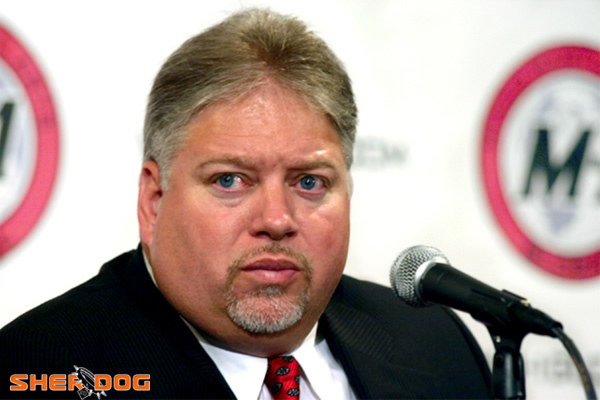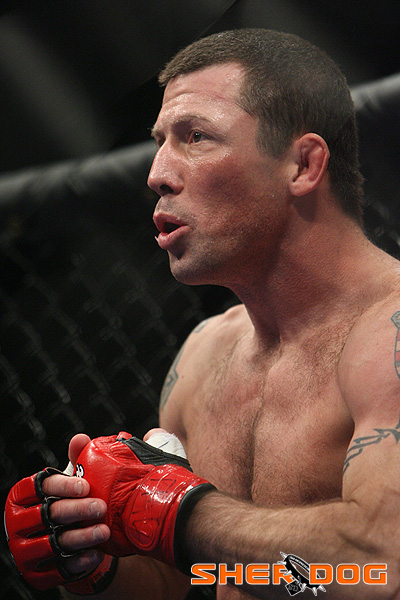Stories from the Road: Monte Cox
Chance Meeting

Monte Cox has seen it all in MMA. | Photo: Matthew
Kaplowitz/Sherdog.com
Sometimes you cannot hear yourself in a busy metropolitan newsroom with the constant ringing phones. Even then, in 1995, with the advent of the Internet and social media still a dot ahead in the distance, the old-fashioned way still worked in passing along a message -- like a piece of paper. However, the crumpled slip with a name and number scrawled on it held out something new to Monte Cox. Curious, Cox looked at it and followed up with a phone call. Little did he know it would be one of those galvanizing, life-changing moments.
Inquiries come in all of the time in the newspaper business. They are nothing unusual when you work in the media field and you are juggling what feels like 600 calls a day that cover the gamut, from mothers trying to hawk their daughter’s Girl Scout cookies to tracking down four-alarm fires. So like any other day, Cox felt obliged to react to this unusual pitch. A local badass, Pat Miletich, was about to embark on a trip to Chicago to fight in something called “Battle of the Masters” and wanted to know if Cox’s paper, the Quad City Times, was willing to write about it. It was MMA, viewed with a jaundiced perspective by most sports editors then as human cockfighting. Cox wanted a deeper perspective. He cast no judgments. He actually sought out Miletich.
Advertisement
Cox told Miletich he was going to join him in Chicago. What Cox witnessed marveled him. Miletich, maybe 175 pounds soaking wet, was blasting through 230- and 260-pound beasts. What’s more, he was doing it before a packed house at St. Andrew’s Gym in Chicago, right by the fabled Wrigley Field. It was a trip that launched a new career, a new life and thousands of crazy adventures for Cox.
“I was promoting some boxing at the time, and I didn’t draw
anything like the crowds this sport drew,” Cox said. “I’m watching
Pat fight. I see the way the fans responded and how they were
attracted by this, and I’m thinking and saying to myself, ‘I can do
one of these.’ I didn’t know anything about it; I didn’t have any
contacts at the time; I didn’t know where to get opponents. I’d
figure it all out.”
He did. Cox, one of the true pioneers of the sport, is one of the reasons why MMA is where it is today. He grew MMA in the Midwest. Above all else, Cox, who has managed eight Ultimate Fighting Championship titleholders, UFC hall of famer Matt Hughes among them, and promoted more than 500 shows, has shown a great ability to cope through some sticky situations while being one of the driving forces behind legitimizing what was once considered a fringe, niche sport and pushing it into the mainstream American sports lexicon.
Today, Cox manages about 50 fighters and still promotes a few shows a year. He has delved into real estate, building 39 townhomes in LeClaire, Iowa. What follows are a trio of vignettes from Cox’s many travels:
THE QUAD CITY ULTIMATE
If Cox was going to step into this uncharted MMA terrain, he was going to go big for his first show. He propped up a local boxing promoter and friend from Indianapolis, Fred Berns, as the face man for what Cox called the Quad City Ultimate at the newly minted 10,000-seat Mark of the Quad Cities Arena in Moline, Ill., on Jan. 20, 1996. Miletich and his friend, a local police officer and local former football star named Mark Hanssen, were going to be the headliners.
“Everyone knew who these guys were, and Hanssen was big -- a 265-pound monster,” Cox said. “They were both fantastic. We made up this cool poster with smoke in the background. We didn’t do TV back then because we didn’t have the knowledge, but Pat and I went out every night and put posters up everywhere. I mean everywhere: nightclubs and bars. Pat was selling tickets out of his pocket. The funny thing here is, because I was still working at the paper, I couldn’t tell everyone I was doing this. I told people I was helping out, so we got my old boxing promoter, Fred Berns from Indianapolis, and said he was the promoter so there was no conflict for me.”
However, there was a problem. The Davenport Police Department was none too pleased with the fact one of its officers was being displayed on the posters for this violent unknown sport many still viewed as a form of backyard wrestling. Cox had to appease the department somehow.
“I called up the police department over lunch one afternoon with the event approaching, knowing the police chief wouldn’t be there, and I disguised my voice: ‘This is Fred Berns, and I heard you’re unhappy about the fight and I’m about to leave for Germany, but Monte Cox is helping me there and if you give him a call, he can help with anything you need,’” Cox recalled with a laugh. “I call back around two and tell them, ‘This is Monte Cox. Fred Berns told me to give you a call.’ They told me that they had to get the Davenport police officer off the poster and I told them, ‘No problem. I’ll do it.’ I go back to the paper for my five o’clock news meeting. One of my reporters tells me there is this huge stir about this police officer taking part in this fight and asks what we should do about it.
“Now I’m caught between a rock and a hard place,” he added. “They knew I was helping with the show. If I say, ‘Put it on Page One,’ they’ll say I wanted the publicity. If I say, ‘Put it inside,’ they’ll say I don’t want to deal with the controversy. I let them decide where to put it. They decided to put it on the front page, and it received all this publicity.”
Quad City Ultimate I drew 8,000 people. Initially, Miletich asked Cox for 1,000 tickets that he was going to sell out of his gym. Cox was pessimistic. He told the fighter to slow down, that he would give him tickets in increments. When Miletich got rid of the first 100 after a few days, he asked Cox for 500 more. Cox still was not convinced. He gave Miletich another 100. They went within a day, so Cox brought Miletich 500 more. They were gone in four days. By the time it was over, Miletich had sold 3,000 tickets out of his gym.
As the event neared, Cox was faced with another dilemma.
“We knew people were afraid to fight certain people, so we did it differently: We did a blind drawing to see who fought who according to weight classes, because I couldn’t get anyone to fight Miletich,” Cox said. “The guy that winds up drawing Miletich was someone from New York named Rick Kleve. He was OK with it. The Kleve guy comes up to me and asks if it’s OK [for him to] use pressure points. I remember telling him, ‘Yeah, you go ahead and do that.’ That night, we had a parade of athletes. They all came out and ran around when they were introduced. We get to the last fight introducing Pat and then we get to Rick Kleve; and the name is announced again: ‘Rick Kleve, Rick Kleve, Rick Kleve.’ We waited and waited and waited. I had three guys standing by who were boxers just in case something like this happened, but I really didn’t think it would happen. This was my first show.
“I ran into the back and Rick Kleve was nowhere to be found,” he added. “One of the security guards said there was some young kid that grabbed his duffel bag and ran out the back door. That was the last we saw of Rick Kleve. There were a lot of posers like that back then, just a lot of guys who wanted to come off tougher than they were.”
Finish Reading » “I walk over in the arena to see how it’s going and I asked Jeremy what Murahama looks like. He tells me he’s a short, stocky guy with bushy hair -- and I ask Jeremy to come over: ‘Like that?’ I asked; and there’s Murahama standing in the ring, and you can hear them going, ‘Jennnnssss Pullllvvvveeerrr.’ I scream, ‘Jens, we’re up!’ He drops the chicken mid-bite, bones fly everywhere and we go running down from the mezzanine to the back. We don’t even have gloves on. We had no time for a robe or anything, and Jens gets to the ring while he’s putting on the gloves as he’s running to the ring.”
Related Articles








